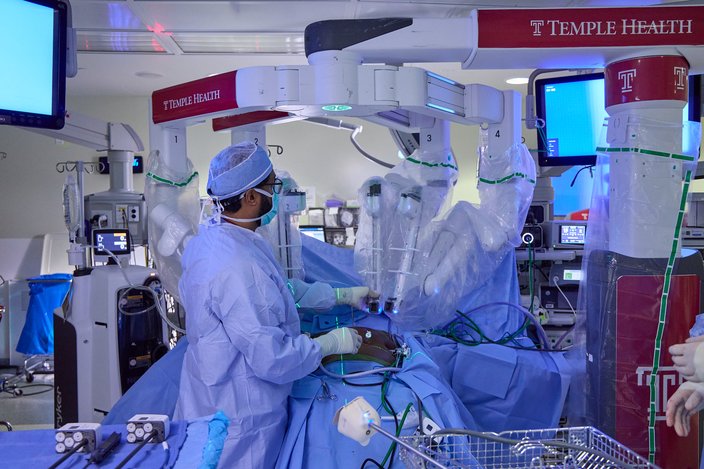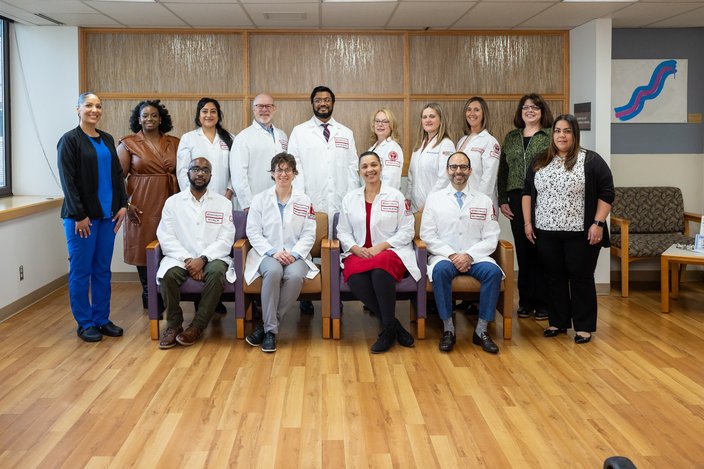
July 31, 2024
 Provided Courtesy/Temple Health
Provided Courtesy/Temple Health
Dr. Rohit Soans, Medical Director, Bariatric Surgery at Temple University Hospital, consults a patient.
Recent advancements in weight-loss drugs, such as Wegovy and similar medications, have marked significant progress in the fight against obesity.
Still, they aren’t magic bullets. While effective, these drugs do have limitations. For one thing, the extent of how much weight can be lost is limited. They also require continuous use to keep the weight off, which can be challenging because their side-effects, such as nausea and other gastrointestinal problems, can be quite unpleasant.
That’s why Dr. Rohit Soans, Medical Director, Bariatric Surgery at Temple University Hospital, thinks their greatest promise lies in how they can be used with other weight-loss treatments, from nutritional counseling to bariatric surgery.
“We’ve been using this approach with patients, and we see that it works extremely well,” said Dr. Soans.
The new weight-loss drugs work by mimicking hormones that regulate appetite and produce the feeling of fullness after eating. The short term effectiveness of these drugs has been proven in clinical trials. In announcing its approvals of Wegovy and Zepbound as weight-loss treatments, the Food and Drug Administration said participants in trials of both lost 12 percent of their body weight. As these drugs are very new, the long term effectiveness and side effects are still unknown.
The arrival of these drugs is timely, considering the Centers for Disease Control estimates that 42.5 percent of Americans 20 and older struggle with obesity and another 31.1 percent are overweight. Both conditions increase the risk for many health problems, including diabetes, high blood pressure, heart attack, stroke, some cancers, and problems with breathing, mental health, sexual function, fertility, and pregnancy.
Still, the drugs’ effectiveness comes with some caveats.
Participants in all the studies that have shown the drugs to be effective received nutritional counseling and support. That means that just taking the drugs without changing eating or lifestyle habits may not produce the results shown in trials of the drugs.
“That’s exactly what we’re seeing,” Dr. Soans said. “So, we’re trying to address that specific problem by providing nutritional counseling to all our patients.”
Also, while shedding 12 percent of their weight can make life better for people who are overweight, those with morbid obesity often need to lose more to get their bodies to a state that’s good for their health.
That’s where bariatric surgery can come into play. Around 90 percent of the patients who undergo surgery lose about half their excess weight and may not regain it with continued focus on changed lifestyle habits.
Like many types of surgery, bariatric surgery is nowhere near as invasive a procedure as it used to be. It’s performed laparoscopically or robotically and usually only takes 90 minutes. When patients wake up in the recovery area, a nurse gets them walking with the plan to go home within 2 days or less. Patients are provided with medication for pain and nausea, but rarely need to take them very long. Most people who have bariatric surgery can return to work within a week. The safety profile of the operation has improved tremendously and it is now safer than gallbladder removal surgery.
Dr. Rohit Soans performing bariatric surgery.
Temple Health offers two types of bariatric surgery procedures.
• Sleeve gastrectomy involves the removal of a large part of the stomach, including an area that produces an appetite-stimulating hormone. This reduces both a person’s appetite and the amount of food they can eat, enabling patients to lose up to 80 percent of their excess weight.
• In the roux-en-Y gastric bypass, a small pouch is created from the stomach and the small intestine is directly attached to this pouch. This limits both how much food a person can eat and, by rerouting food, how many calories they can absorb. The average weight loss after the procedure is about 85 percent of excess body weight.
As the new weight-loss drugs have become more available, Temple has begun using them to help some bariatric surgery patients lose weight before their operation. This combination therapy is helping patients achieve long term, sustainable weight loss, without the prolonged use of medications.
Maximizing the effects of bariatric surgery requires lifestyle changes, which is why the Temple Bariatric team provides patients with nutritional counseling prior to surgery. Patients average seven to eight visits with a Temple nutritionist before their procedure, Dr. Soans said.
The Bariatric Team at Temple University Hospital
Additionally, Temple performs socioeconomic evaluations of prospective bariatric surgery patients to ensure they can get to post-surgical follow-ups and afford the multivitamin tablets they need to take after their operation.
While the procedure is much easier and safer to undergo than it used to be, bariatric surgery is at one end of a spectrum of weight loss treatments that begins with diet and lifestyle changes.
The new weight-loss drugs fall somewhere in the middle of that spectrum. While they may not, by themselves, be the best treatment option for people who struggle with obesity, Dr. Soans does believe these drugs can benefit most people with the condition.
“We’re going from a phase where people just ignored their obesity completely and didn't think that there was anything that they could do, and now they're starting to seek options,” he said.
If excess weight is affecting your daily life or your health, bariatric surgery may be the solution that will help you achieve long-lasting results. The Temple Bariatric Program offers minimally invasive procedures and a dedicated, multidisciplinary team to help you through every step of the way.
To learn more about bariatric surgery, you can watch Temple’s free online informational seminar at home at any time. During the video seminar, an experienced bariatric surgeon presents an overview of weight-loss surgery and the lifestyle changes necessary for long-term success. After you watch the video, you can request a consultation with one of Temple’s bariatric surgeons by calling 866-410-0607 or completing an online form.
 Provided Courtesy/Temple Health
Provided Courtesy/Temple Health Provided Courtesy/Temple Health
Provided Courtesy/Temple Health